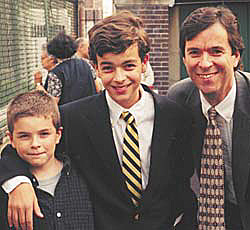A Noble Calling

Duffy (right) with sons Chris (center) and Zach.
|
For 20 years Mark Duffy, MPA ’82, worked on the 61st floor of the World Trade Center with the Port Authority of New York and New Jersey. As a member of the human resources department, he recruited and hired the agency’s work staff while facing a shrinking budget, limited political support, and politicians and others who stereotyped civil servants as lazy and uncaring.
All of that changed, Sept. 11, 2001, when two commercial airliners flew into the side of the twin towers, and his office, along with 20 years of work, literally came crashing down around him.
Suddenly the political disagreements were minimized and the stereotypes disappeared. Americans saw not only the firemen and policemen digging through the rubble of the World Trade Center but also the civil servants in the Port Authority who risked their lives to help save a wounded nation.
“Because we owned and operated the building, most of us felt an obligation to help people get out,” Duffy said. “In fact, there were many World Trade Department Port Authority employees who died in the building because they stayed and helped evacuate people.”
In all, 37 Port Authority police officers and 38 civilian Port Authority employees died Sept. 11. But despite their own lost co-workers and headquarters, the Port Authority did not skip a beat in reconstructing and comforting New York.
On the day of the attacks, Duffy emerged from the subway to see the hole in the building and the smoke pouring out. Like many Port Authority staff members, he rushed to help people trapped in the building.
Turned back by police who had already cordoned off the building, he was unable to help people as he did during the 1993 bombing on the World Trade Center.
That evening he called other members of the HR department to establish who survived the attacks and to determine what role they needed to play in the recovery effort. By the next day Duffy and members of his department were working with the Port Authority’s office of Emergency Management to create an emergency response team that met regularly with Mayor Giuliani to plan the city’s response to the attacks and guarantee the tunnels, bridges, PATH rail system, and airports would continue to run smoothly. Duffy also helped to establish an emergency response center to help families who lost loved ones in the attacks.
Workdays stretched to 12 hours, seven days a week. “A lot of people were going through a roller coaster of emotions,” Duffy said. “We all kind of felt our way through. We ate many meals together and that was really helpful to take a few minutes at dinner or lunch to talk and decompress.”
Duffy shared hugs and prayers that reinforced a gentle strength among his co-workers. His “dedicated, religious, selfless, and positive” attitude brought his colleagues together to “create a warm, supportive environment so that people could respond in a way that would help as many people as possible instead of dwelling on the horror,” said GW Professor Bill Adams, who met Duffy more than 20 years ago when Duffy was a graduate student and his research assistant.
As Duffy supported his staff, he also organized case management teams to establish personal contact with people affected by the attacks. They answered questions and provided practical counseling for gathering DNA samples for identification purposes and helped family members access bank accounts and deal with insurance, among other needs.
For the deep compassion he showed to his co-workers and the victims’ families, Adams and the GW School of Business and Public Management presented Duffy with the Department of Public Administration’s 2002 Outstanding Alumnus Award.
“We saw Mark as a symbol for what many of our graduates did. He was right there in the center of the response and playing a key role,” Adams said. “He epitomizes the dedication and leadership that GW MPAs have shown in many fields of public service.”
Graciously accepting the award, Duffy pointed out that his actions on Sept. 11 and during the 1993 bombing of the World Trade Center were no more distinguished than the actions of many others. “In the end, we will succeed not because of one famous person’s distinguished leadership but instead through the actions of hundreds of dedicated people doing their jobs under the most difficult and stressful circumstances,” Duffy said at the award ceremony. “We are all part of a noble calling.”
—Elizabeth Crawford
|